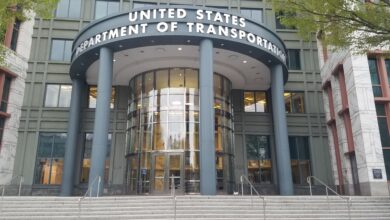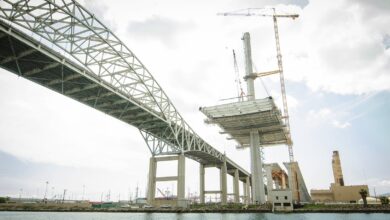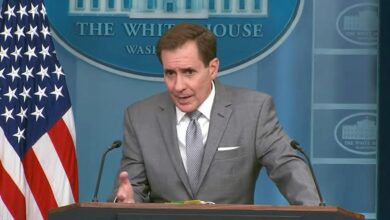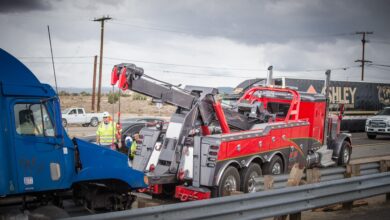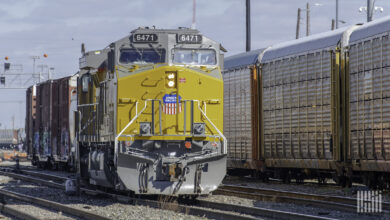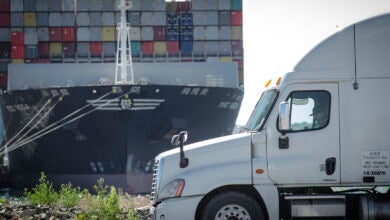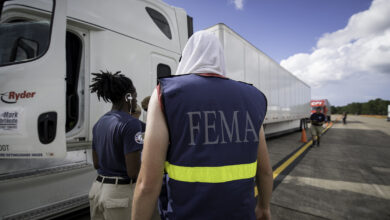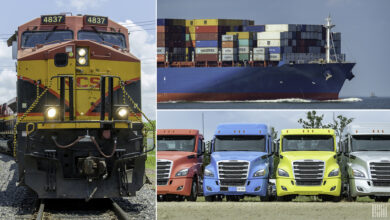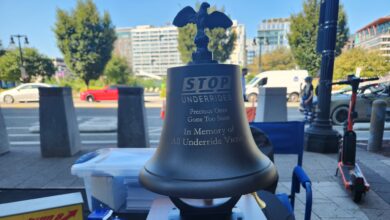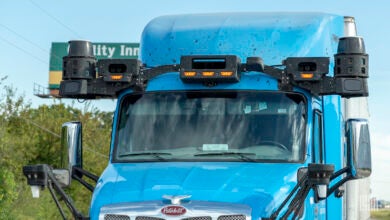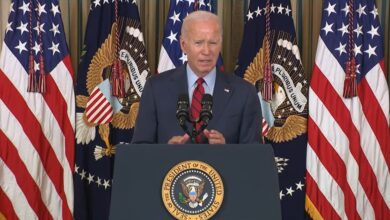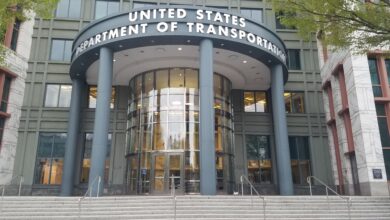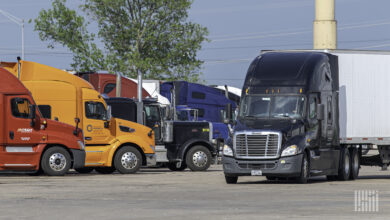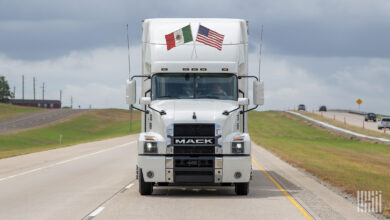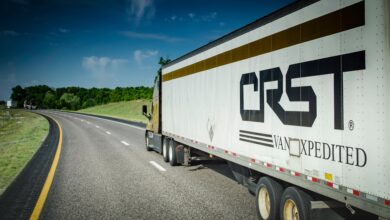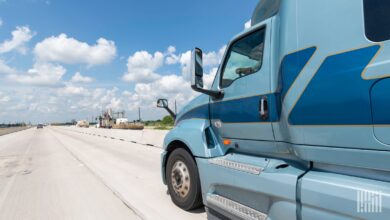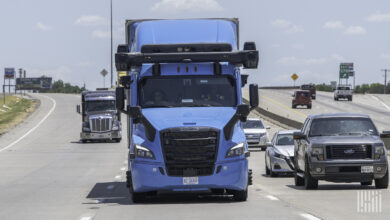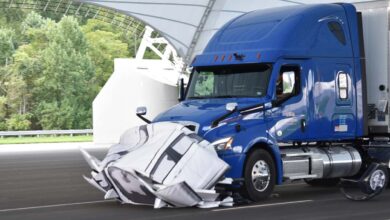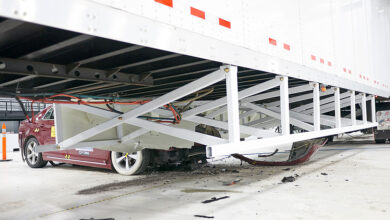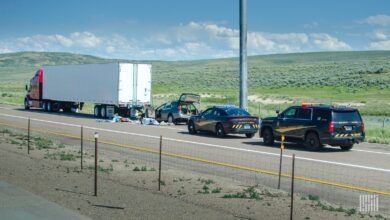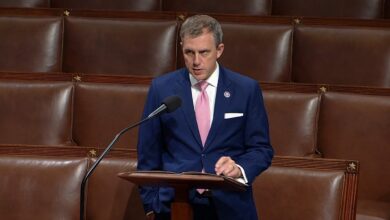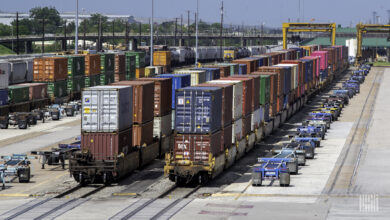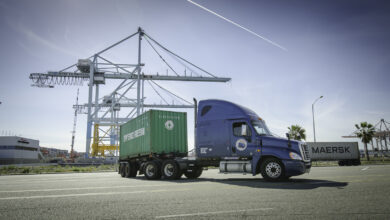Other FreightWaves Products
John Gallagher
FMCSA Administrator Robin Hutcheson to resign
Nation’s top truck safety regulator, Robin Hutcheson, will step down Jan. 26, according to DOT.
TIA warns Congress of rampant fraud in trucking
Lawmakers are told that criminals are registering as fake trucking companies with FMCSA.
Is FMCSA tipping its hand on carrier safety fitness?
FMCSA is providing a rare glimpse into documents it will consider in formulating a significant safety rule.
DOT tangles with watchdog over $1.5 billion in freight grants
Highway, port and freight rail projects are caught up in a Government Accountability Office report questioning how the Department of Transportation justifies infrastructure investments.
Postal Service EV rollout off to shaky start
Thefts from a storage facility have raised concerns from a government watchdog agency as the Postal Service moves to electrify its delivery fleet.
White House warns Red Sea turmoil could hit US economy
White House spokesman John Kirby said shipping risks caused by the Middle East conflict could become a “pocketbook” issue for Americans.
CVTA: Trucker wages at stake in Florida’s CDL exemption request
Relaxing CDL testing rules could get drivers on the road faster without risking safety, according to a training school group.
Labor, climate costs loom large for trucking in 2024
After truck parking and broker transparency grabbed headlines in 2023, experts see independent contractor status and truck emissions as top issues next year.
DOT’s freight data exchange processing 65% of US container imports
Multimodal freight office leader Allison Camden has high expectations now that freight “has a seat at the table.”
Republicans pan truck speed limiter proposal at House hearing
FMCSA chief Robin Hutcheson was grilled by Republicans on the safety implications of a federal rule to effectively mandate truck speeds.
RXO sees ‘too much capacity’ in trucking heading into 2024
Pace of carrier exits needs to speed up to achieve economic balance in the truckload sector, according to RXO Chief Strategy Officer Jared Weisfeld.
Trailer side-guard rule likely delayed until at least October 2024
DOT’s latest regulatory agenda reveals regulators will be taking no action on a costly new safety equipment proposal for almost a year.
FMCSA issues policy on sexual assault among truck drivers
Trucking regulator reminds states of federal laws disqualifying convicted felons from having a CDL.
Truck parking expansion money still elusive on Capitol Hill
Local opposition and divided attention in Washington are hurdles that must be cleared before the trucking industry can get parking legislation passed.
Florida seeks help for truckers failing pre-trip inspections
CDL testing in Florida could get easier if regulators grant an exemption to driver instructors.
Feds told to start rating ‘unrated’ trucking companies for safety
A government system that leaves most of the trucking industry without a safety rating needs an overhaul, carriers and brokers tell regulators.
Indiana tops predatory truck-towing list
A new study looks at the causes and severity of excessive heavy-duty truck towing fees.
Railroads take on EPA’s pollution-reporting proposal
EPA’s proposal to consider mandating air pollution reporting could place new burdens on rail yards and rail carriers, critics say.
DOT finalizes rule requiring states to track vehicle CO2
Road builders say the Biden administration’s new emissions performance rule goes beyond the intent of Congress.
Petitions for meal, rest break waivers dispute parking shortage claims
The Teamsters and crash victim advocates say claims that parking shortages will be made worse by California’s and Washington’s rest break rules are unfounded.
FMCSA tightens regulations to prevent fraud by brokers
A final rule issued by federal regulators aims to protect truckers from broker fraud.
Advisers to FMCSA waver on support for trucker overtime pay
A federal advisory panel promoting women in trucking weakened its stance on removing an exemption that currently allows carriers not to pay overtime to their drivers.
Trucks and teen motorists a dangerous mix, NTSB panelists say
Improving road safety and public health is the goal of a new push to help teen drivers learn to share the road.
As economy motors along, trucking prepares to downshift
FreightWaves CEO Craig Fuller sees bad signs from banks — and trouble ahead for brokers — as he looks to the first quarter of next year.
Senate approves bill to help vets get CDLs
Military veterans are closer to gaining more access to a CDL with the passage of legislation aimed at cutting GI Bill red tape.
DOT pumping more truck capacity into US ports
Trucks are featured heavily in projects reaping $653 million worth of port infrastructure grants announced Friday by the Biden administration.
Truckers push FMCSA to make brokers pay for detention time
Truck drivers are pressing regulators to require brokers to pay them for time lost waiting to pick up or drop off loads.
NLRB joint-employer rule triggers fears of higher trucking costs
A new federal labor standard opens up trucking companies to a wider range of costly employee liabilities, according to a legal expert.
Trucking congestion costs hit record $94.6B
Inflation, higher cargo volumes and diesel prices fueled a spike in congestion costs for trucking companies, according to new data from ATRI.
New data shows 14% decline in large-truck fatalities
FMCSA’s latest crash data is a hopeful sign for safety as trucking regulators consider new rules to reduce deaths and injuries.
12% new-truck tax panned at highway funding hearing
U.S. Rep. Doug LaMalfa, R-Calif., argues that a long-standing tax on new trucks is an inefficient way to sustain the ailing Highway Trust Fund.
Trucker out-of-service orders hit all-time high
Data reveals 2023 will be a record year — by far — for commercial carrier shutdowns ordered by the government for new carriers.
FMCSA extends protections for under-21 harvest haulers
Truckers under age 21 serving the agriculture sector will continue to receive an exemption to avoid interference from law enforcement.
FMCSA cuts back on relief for drivers during emergencies
Trucking companies and drivers will see shorter windows on regional emergency exemptions provided by the agency.
Audit: Postal Service contract truckers had their kids riding along
Postal Service auditors have advised the agency to boost oversight of contract trucking companies.
What happens to freight if the government shuts down?
Here’s how 10 federal agencies plan to protect carriers and their customers if Congress fails to approve funding by Saturday night.
OOIDA calls long delay in truck broker rate transparency rule ‘BS’
A new regulatory agenda sets dates for trucking sector rulemakings ranging from speed limiter mandates to automatic emergency braking.
Cutting emissions is affecting shippers’ modal choices
Freight-movement data reveals the importance of factoring sustainability measures into transportation planning.
Lawmakers drag Buttigieg into UAW fight
U.S. Transportation Secretary Pete Buttigieg faced partisan attacks over EV policy during a House oversight hearing.
FMCSA told to make all carrier complaint data public
GAO recommends FMCSA improve its website so that it is more useful for truck drivers seeking remedies for alleged coercion by employers.
Crash victims allege DOT violations related to underride guard report
A too-cozy relationship between the trucking industry and regulators may be putting lives at risk, crash safety advocates contend.
FMCSA proposing crash-data appeals process for drivers
Complaints about transparency and accuracy of safety data that affects the operations of truck drivers and carriers has caught the attention of federal regulators.
Truck driver jobs at center of House hearing on automation
Lawmakers on both sides of the aisle pressed the American Trucking Associations and tech companies over job and safety concerns associated with driverless trucks.
Only 1 key trucking bill likely to pass in Congress, GovTrack says
FreightWaves looks at prospects for trucking legislation as lawmakers return to Capitol Hill after the August recess.
Biden hails ratification of West Coast dockworker contract
Along with a six-year port agreement, President Biden is underscoring the role of UPS Teamsters and ocean shipping reform in boosting the U.S. economy.
New anti-harassment guidance could raise compliance bar for trucking
Advocate for female truckers says new EEOC policies are overdue.
Freight interests frustrated with leadership vacuum at DOT
Rail, port and trucking interests want the Biden administration to ramp up oversight and coordination of the multi-billion dollar infrastructure law.
FMCSA seeks advice on new safety rules for carriers
A new safety standard would change how FMCSA determines whether carriers and truckers are fit to operate.
AARP pushes feds to protect older pedestrians from truck accidents
FMCSA and NHTSA should incorporate braking technology to avoid crashes involving more than just other vehicles, AARP warns.
FMCSA details new truck driver detention time survey
Federal regulators will attempt once again to try to figure out the safety and cost effects of delaying truck drivers at shippers and receivers.
Automation underperforming for US Postal Service, watchdog says
Automated equipment put to work for the U.S. Postal Service failed to achieve projected savings, according to the agency’s watchdog.
NHTSA denies Mack Trucks’ turn-signal lamp exemption
Federal regulators are cracking down on trucking-related exemption requests that fail to provide safety justifications.
FMCSA’s erratic history on meal/rest break preemption
Regulators are leveraging their power to once again weigh in on state laws affecting truck drivers.
FMCSA will consider rollbacks to truck driver rest-break rules
Regulators may use waivers to give California and Washington more power over truck driver work rules that the Trump administration found were preempted.
Safety officials on automatic emergency braking mandate: Not so fast
A proposal requiring automatic braking on trucks needs more than a 60-day comment period, state agencies and brake manufacturers assert.
Feds call attention to maritime ‘near misses’
DOT and MarAd are moving on a new database aimed at preventing vessel collisions.
Watchdog: FMCSA’s oversight of Mexican carriers needs work
DOT’s inspector general recommends FMCSA take steps to clamp down on foreign carrier safety compliance.
FMCSA cites safety record in granting CRST’s CDL exemption
Getting drivers on the road faster boosts productivity, says CRST, which was conditionally granted a CDL exemption renewal.
Ocean carriers warn FMC against regulating prices
Requiring container ship operators to file an export policy would be too costly — and unlawful as well, carriers tell regulators.
Major trucking companies seek exemption for driver trainers
Federal rules on driver instructor background requirements are hampering carriers’ ability to staff trainers, according to companies.
Where is DOT’s Freight Office?
The Department of Transportation’s “supercharged” Freight Office will be tasked with overseeing and coordinating competitive grants and how they fit into a national freight strategy.
NHTSA pressured to overhaul rulemaking on side underride guards
Federal regulators have been asked to significantly revise — or scrap altogether — a rulemaking requiring side underride guards for new truck trailers.
Reaching the next level of fleet-safety AI
Trimble’s Jesse Chappell discusses how video AI in trucking is gaining momentum with enterprise fleets.
FMCSA denies prison inmate CDL training exemption
Exempting former prison inmates from certain CDL training rules could not ensure that safety standards would be upheld, according to federal regulators.
House passes defense bill with ban on Chinese shipping platform
The National Defense Authorization Act amendment is aimed at blocking China’s ability to monitor U.S. container flows.
FMCSA advisory panel targets predatory leasing contracts
The first meeting of FMCSA’s Truck Leasing Task Force has put lease-purchase agreements under more intense scrutiny.
Is Washington stepping up for truck drivers?
FreightWaves spoke with research scientist David Correll about how much progress has been made toward addressing workforce challenges.
NHTSA rejects call to make AV test reporting mandatory
The voluntary structure of NHTSA’s automated vehicle testing initiative will hinder the agency’s ability to modify AV safety regulations down the road, OOIDA contends.
Truck parking in Texas, Louisiana gets $33.5M boost from DOT
Government sponsors are finding ways to add capacity for truck parking through long-standing federal grant programs.
Feds propose automatic emergency braking systems for heavy-duty trucks
NHTSA and FMCSA are proposing that all new trucks over 10,000 pounds be equipped with automatic emergency braking systems.
Diesel trucks taking up EV slack to meet cargo demand in California
Harbor Trucking Association’s Matt Schrap warns about the effects that California’s carbon emissions restriction is having on the drayage industry and the environment.
Trucking group: Study supports greater use of hair tests for drivers
Hair testing finds significantly more opioid, cocaine and meth use by truck drivers versus testing for those drugs using urinalysis, a recently updated study finds.
FMCSA issues final guidance to expose illegal brokers
Move by federal regulators to crack down on broker scofflaws gets mixed reviews from broker and carrier groups.
FMCSA to consider requiring proficiency tests for new carriers
A 14-year-old petition filed by a truck safety group to strengthen new-entrant requirements has finally been greenlighted for public scrutiny.
Trucking tells FMCSA crash reporting presumes drivers guilty
FMCSA puts unfair burdens on truck drivers and carriers in accident reporting, the agency is told.
NHTSA side underride analysis slammed by safety, insurance advocates
The Biden administration is using a flawed analysis to inform a potential rule mandating lifesaving equipment on truck trailers, according to safety and insurance groups.
Feds report more truck drivers dying from not using seat belts
The latest federal data reveals that 64% of large-truck drivers killed in crashes were not wearing seat belts.
Study unable to firmly connect legal pot and truck safety
The effects of marijuana impairment on truck driving is not fully understood due in part to limited research, according to a new ATRI report.
FMCSA wants more regulation of tests for new truck drivers
Regulators explain the rationale behind an upcoming rulemaking for third-party CDL knowledge testers versus issuing a permanent waiver.
California Dems lobby DOT for $700M electric truck charging project
A project sponsored by West Coast states is seeking the entire first round of federal funding set aside for zero-emission charging and fueling networks.
Can EPA’s electric truck proposal survive political scrutiny?
An all-electric truck future by 2045 could face serious roadblocks.
Lead sponsor of TIA-backed truck safety bill withdraws support
A truck broker lobby plans to regroup after losing momentum for a bill requiring interim standards for brokers.
House transportation committee OKs $755M to expand truck parking
Legislation to increase truck parking advanced in Congress during the markup of 16 supply chain-related bills.
Congress overturns nitrogen oxide emissions rule for trucks
President Biden plans to veto a resolution passed by Congress on Tuesday to overturn the EPA’s rule on nitrogen oxide emissions from trucks.
Lawmakers look to bolster ranks of young truck-driver program
A bill seeking to simplify eligibility for truck driver apprenticeships is part of a legislative package addressing supply chain shortfalls.
Trucking, safety groups line up against anti-speed limiter bill
Opposition is growing against a bill that would prevent the FMCSA from issuing a regulation mandating maximum speeds for trucks.
Ports call out ‘sensationalized’ targeting of foreign container cranes
A group representing the nation’s largest container ports contends lawmakers are misleading the public with a bill targeting Chinese-made container cranes.
Capitol Hill panel debates truck speed limiters, broker fraud
Truckers, brokers and fuel retailers told Congress where they believe regulators are overstepping their authority — and where they need to step in.
Report finds higher hours-of-service violation rates since 2020 revisions
A report to Congress shows that truck safety may have gotten worse since regulators loosened hours-of-service rules in 2020.
Ocean carriers: Keep rail storage fee disputes at STB
Shippers want Congress to expand FMC’s power over rail storage fees, but shipping lines say the power is already in the hands of the STB.
Lawmaker vows to block speed limiters on trucks
Oklahoma Congressman Josh Brecheen calls FMCSA’s speed limiter proposal an “overreach” and introduces legislation aimed at heading it off.
Truck makers take on EPA’s zero-emissions carbon rule
Truck manufacturers told EPA that a zero-emission mandate without charging infrastructure to support it would fundamentally change trucking.
FMCSA names panel targeting predatory lease-purchase agreements
Trucking industry representatives and others have been tasked with evaluating unfair leasing practices by carriers against owner-operators.
DOT issues final rule on oral fluid drug testing
Carriers and drivers will not be able to take advantage of a new drug testing rule due to a lack of certified testing facilities.
DOT: ‘Confounding factors’ hindering safety analysis of ELD mandate
Federal regulators have told Congress that assessing the safety impacts of ELDs has become a challenge.
$400 million in federal grants targets truck pollution at ports
The Biden administration has opened the first round of a $400 million, five-year grant program to clear truck pollution at seaports.
Breaking the myth of the embattled small trucker
Small-fleet summit keynoter Lewie Pugh from OOIDA reveals the secrets of success to thriving as an owner-operator in a down market.
Bill introduced to prevent ocean carrier price gouging
Legislation giving FMC more power over alliances is aimed at preventing anticompetitive container carrier agreements.
DOL nominee announces ‘progress’ in West Coast labor talks
Biden’s labor secretary pick says she’s ready to step in if West Coast dockworkers and their employers cannot resolve their remaining issues.
FMCSA denies hours-of-service exemption for propane haulers
Propane haulers were unable to convince federal officials that a work-rule exemption could be provided without boosting crash risks.










